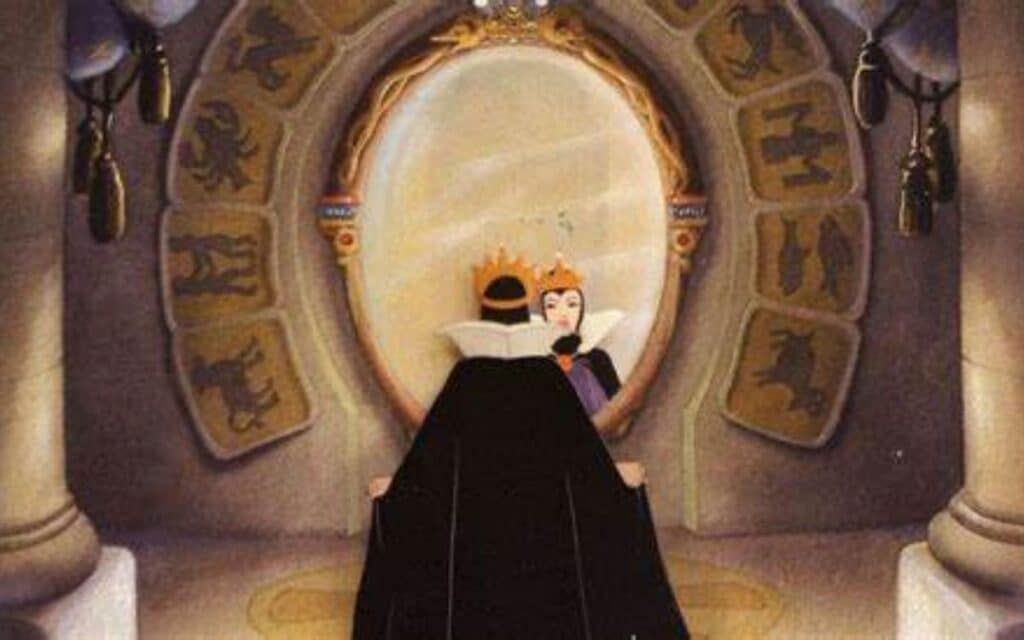Mirrors play a crucial role in witchcraft, serving as tools for divination, protection, and accessing spiritual realms, while also being steeped in superstitions and folklore, writes LES HEWITT

Mirrors have long held a mystical allure, transcending their simple function as reflective surfaces to become potent symbols in various cultural and esoteric traditions.
In witchcraft, mirrors are not just objects of vanity but serve as powerful tools with profound significance.
Their role in witchcraft is multifaceted, encompassing divination, spell work, and protection, while also being surrounded by a rich tapestry of superstitions and folklore.
The Reflective Power of Mirrors
At its core, a mirror’s reflective nature makes it a symbol of duality and the boundary between the material and spiritual worlds.
In witchcraft, mirrors are often viewed as portals to other realms or dimensions.
This belief is rooted in the idea that mirrors can capture and project energies, enabling practitioners to access hidden knowledge or interact with supernatural entities.
Mirrors are frequently used in divination practices, most notably in scrying – a method where one gazes into a mirror or other reflective surface to receive visions or messages from beyond.
This practice, sometimes called “mirror scrying” or “catoptromancy”, is based on the belief that the reflective surface acts as a gateway to the unconscious mind or spiritual dimensions.
Scrying mirrors, often darkened or specially prepared, are believed to facilitate deeper connections with the divine or spirit world, allowing witches to gain insights or foresee future events.
Mirrors as Magical Tools
In witchcraft, mirrors are also employed in spell work and rituals. They can be used to amplify intentions, enhance visualisation, or create protective barriers.
For instance, a common practice is to use mirrors in protection spells. By placing mirrors facing outward around a space, a practitioner can create a reflective shield that deflects negative energies or malevolent forces away from their home or personal space.
This reflects the ancient belief that mirrors can reflect not only physical images but also metaphysical influences.
Mirrors are also used in love spells and attraction magic.
A spell might involve writing the names of loved ones or desired qualities on a piece of paper and placing it under a mirror, thereby harnessing the mirror’s reflective power to draw those qualities into one’s life.
This underscores the mirror’s role as a conduit for manifesting desires and enhancing personal power.
Mirror Superstitions and Folklore
The relationship between mirrors and witchcraft is deeply intertwined with various superstitions and folklore.
Many of these beliefs stem from historical associations between mirrors and the supernatural, as well as the mirror’s capacity to evoke fear or awe.
One prevalent superstition is the idea that mirrors can trap souls or spirits. This belief can be traced back to ancient cultures, where mirrors were thought to be gateways to the spirit world.
In some traditions, it was believed that breaking a mirror could lead to seven years of bad luck because it was thought to release the soul trapped within the glass.
This notion is echoed in various witchcraft traditions, where mirrors are handled with care to avoid accidentally attracting or trapping unwanted spirits.
Another well-known superstition is the practice of covering mirrors in a house where someone has died. This custom is rooted in the belief that the mirror might capture the departing soul or attract malevolent spirits.
Covering the mirror is intended to protect both the deceased’s spirit and the living from potential disturbances.
Mirrors are also associated with the concept of “seeing the future” or divining one’s fate. In folklore, mirrors are sometimes thought to reveal prophetic visions when used at specific times or under particular conditions.
For instance, it was believed that if a young woman gazed into a mirror by candlelight on Halloween night, she might see the face of her future spouse. This reflects the mirror’s role as a symbol of revelation and insight in witchcraft.
The use and superstition surrounding mirrors in witchcraft also have historical and cultural dimensions.
In medieval Europe, mirrors were rare and expensive, often considered magical or otherworldly objects due to their ability to reflect and distort reality. This rarity contributed to their association with witchcraft and the occult, as they were seen as mysterious and powerful tools.
In ancient cultures, such as those in Egypt and China, mirrors were used in rituals and spiritual practices. They were believed to have protective properties, warding off evil spirits and bringing good fortune.
In these traditions, mirrors often featured intricate designs and were used in ceremonial contexts, highlighting their importance in spiritual and magical practices.
Modern Interpretations and Practices
In contemporary witchcraft, the role of mirrors has evolved but remains significant. Modern witches and practitioners often incorporate mirrors into their rituals, spells, and meditations, drawing on both historical and personal interpretations of their power.
Mirrors are used in practices ranging from self-reflection and shadow work to more elaborate magical workings involving their reflective properties.
The use of mirrors in modern witchcraft often emphasises the personal connection between the practitioner and the mirror.
For example, using a mirror to engage in self-reflection or to work on personal growth aligns with the broader symbolic meaning of mirrors as tools for introspection and transformation.
Conclusion
Mirrors occupy a unique and complex position in witchcraft, serving as both practical tools and symbols imbued with rich esoteric significance.
Their reflective nature makes them ideal for divination, protection, and spell work, while their association with various superstitions and folklore highlights the deep-seated cultural beliefs surrounding their magical properties.
Whether used to glimpse the future, ward off negative energies, or reflect one’s inner self, mirrors remain a powerful element in the witchcraft tradition, bridging the tangible and mystical realms.
Have you ever used a mirror for spiritual or divination purposes? Share your experiences in the comments section below!







